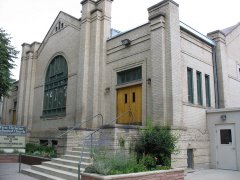I encountered what could only be referred to as irony in my sermon preparation this week. I've been doing my best to write a compelling, relevant, biblical sermon on Daniel 2--and on the "Revealer of Mysteries" that is so frequently referred to there. But in the meantime, I've felt enshrouded in mystery myself. For some reason, I can't seem to see this text with the clarity I would like. I've found myself keeping company with Nebuchadnezzar--tossing and turning at night as I try to understand what God is trying to "reveal" to us in all of this.
Come Sunday (barring major a major revelation in the next 48 hours), I'll be talking about how God's knowledge of the future assures us of his control of the future. But I've also thought--more than once--that this text might take us a different direction.*
It seems to me that old Nebuchadnezzar is on a quest for truth in this passage. He's looking for a kind of truth that doesn't come about through human intuition, or the standard Babylonian ways of knowing that he had long depended on. This methods of knowing the deeper mysteries of life are ultimately insufficient and not dependable. Nebuchadnezzar needs something more. He needs a revelation from God. (That's why he ups the ante with his court astrologers and has them tell the dream--because he wants to know that they can be trusted).
The parallel is less exact than I'd like (and that's one of the reason's I didn't preach this) but it seems to me that there may be a very strong Christ connection in this passage. After all, Paul frequently refers to Christ as the "mystery of God" (do a search--it's rather fascinating. Or start with Col 1:25-2:5, 1 Cor. 15)**. The question for us then becomes how we can know the truth about the mystery of Christ.
There are plenty of places to start when we're searching for the "meaning of the mystery" that is Christ. Apologetic arguments, intuition, the words and witness of passionate believers. But in the end, our conviction of the truth of this mystery will not come from our normal sources of understanding; it will not come from our quest to discover and discern Christ. Ultimately, it will come from God's movement toward us. It will come from his act of revelation. And if we take Daniel's actions as a cue, it will only come when we step out in faith and enter a relationship (prayer) with him.
I think it's something worth considering. I know some folks (some readers here?) who are curious about the Christian faith, curious about Christ, but don't know how they can know for certain. To them, I'd say--step out in faith. Pray that God will reveal this truth to you (or to your loved ones). Or if you're a person who struggles with day to day doubts, with the plausibility of what we confess to be true as Christians (which most of us who think about these things will do at some point)--pray to God to reveal the mystery to you. Ask him to give you true wisdom and insight into the certainty of life with Christ.
*More than one, actually. If I get around to it, I'd like to jot down a few things on the politics of Daniel 2.
**A connection can also be made with the "wisdom" idea that comes in Daniel's Song (Chap 2.20 ff)--God gives wisdom, and the wisdom of God is the foolishness of the world--the cross of Christ that we know through the Spirit. Cf. 1 Cor 1
Subscribe to:
Post Comments (Atom)

1 comment:
Some thoughts on understanding the "mystery that is Christ". I agree that (paraphrasing the old hymn) we seek the Lord and afterward we know he moved our souls to seek him seeking us. But what "shape" does that encounter take? - there's the rub for most of us.
Here is where I have to agree with Buechner - we must "listen to our lives".
Reread the last chapter of The Longing for Home, particularly the quote from Albert Schweitzer.
Post a Comment